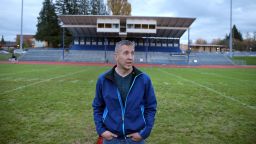A high school football coach who was banned from taking a knee for a brief personal prayer after football games is taking his challenge back to the Supreme Court, the latest such dispute to reach a conservative court that has moved to expand greater protections for religious believers.
Later this fall, the justices will consider whether to take up the long-running case that involves Coach Joe Kennedy of the Bremerton School District in Washington, who alleged his rights were violated when the school district prohibited him from praying at the conclusion of football games.
The school district said it did not discipline him for silent, private prayers – a practice that began in 2008 when he was hired – and only threatened to discipline him after he prayed on the 50-yard line when players were on the field and the crowd was still in the stands. A photo of Kennedy praying with about 20 players in uniform kneeling with him is a part of the record.

Kennedy lost his case at the district court level and before the 9th US Circuit Court of Appeals. A larger panel of judges on the appeals court declined Monday to rehear the case, and Kennedy’s lawyers immediately said they will head to the Supreme Court
“We will appeal and are confident that the Supreme Court of the United States will right this wrong,” said Jeff Mateer, First Liberty Institute’s chief legal officer. “Banning coaches from praying just because they can be seen contradicts the Constitution. Coach Kennedy has been denied the freedom to coach for over five years, but he’s never been a quitter. We will fight on.”
The appeals court pointed out that before the school district placed Kennedy on leave, it offered to accommodate him in a way that “would not be perceived as District endorsement of religion” by providing a private location in the school or allowing him to wait until the crowed dissipated before taking a knee. But Kennedy and his lawyers rejected the accommodation. Kennedy did not apply for a 2016 coaching position.
This case has already once come before the Supreme Court. The justices ultimately sent it back to the lower courts in 2019, stating that more facts needed to be developed in the case. But Justice Samuel Alito, joined by Clarence Thomas, Neil Gorsuch and Brett Kavanaugh, wrote a statement expressing concern about the lower court opinion.
“What is perhaps most troubling about the Ninth Circuit’s opinion is language that can be understood to mean that a coach’s duty to serve as a good role model requires the coach to refrain from any manifestation of religious faith – even when the coach is plainly not on duty,” Alito wrote.
Last term, in a series of closely divided emergency orders, the court ruled in favor of houses of worship that objected to Covid-related restrictions. A unanimous court also sided with a Catholic adoption agency that refused to work with same-sex couples as potential foster parents out of objections to same-sex marriage. But Alito, joined by Thomas and Gorsuch, wrote a lengthy opinion criticizing his colleagues for failing to issue a broader opinion that would have overturned decades-old precedent and made it much more difficult for the government to pass laws that impinge on religious beliefs.
Alito last fall also gave a speech to the conservative Federalist Society arguing that “religious liberty is fast becoming a disfavored right.”


